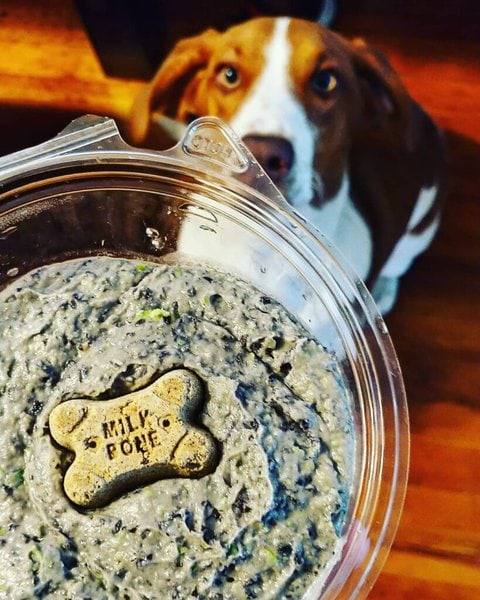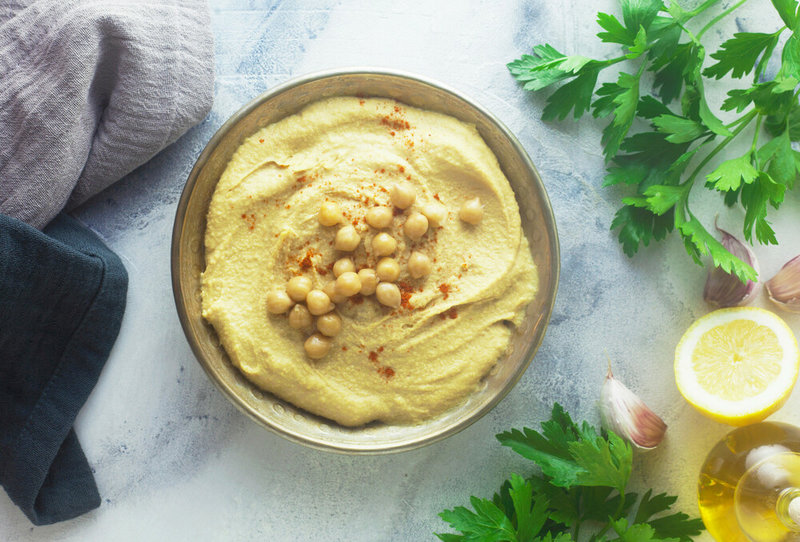Have you ever noticed that whenever you eat hummus in front of your Fido, your Fido starts staring at you with cute eyes, expressing its feeling of munching everything you eat? We love to eat this mouth-watering hummus every so often. However, the question arises of whether it is safe for our pup or not.
No, hummus is not at all safe for your little pooch. As it is deemed a staple food in the Levant or Western Asia, it is made of various ingredients nutritional to humans but not suitable for your Fido at all. It can potentially damage your Fido’s health and internal organs.
If you weren’t aware of this fact and were thinking about adding hummus to the diet of your canine, stop right here and read this article in detail. In this article, we are all lined up with the details of everything that falls under the umbrella of “hummus for dogs.”
Ranging from what makes hummus dangerous for canines to how to make dog-friendly hummus for your little pup, everything will be discussed in the given article. So, without blinking one more time, let’s dive into the depth of why your Fido can’t have hummus?
Will Hummus Make My Dog Sick?

There are several ingredients present in hummus that, although beneficial to us, are no less than poison for our pups, including garlic, onion, lemon juice, parsley, and an excess of olive oil.
Although many good ingredients beneficial for your pooch’s health are also present in hummus, the harmful ingredients counteract all the sound effects. They balance the good ingredients of the hummus to some extent, though they have more potential to turn it into something purely dangerous for your canine.
But before discussing its ingredients in detail, let’s give a brief overview of hummus.
Hummus
Being the Middle East in origin, hummus is a very tasty, delicious, mouth-watering dip that is one of the favorite dishes among Americans. This yummy spread became famous during the 1960s in the United States under the influence of Arab culture.
Ingredients Used To Make Hummus
From raw chickpeas to salt for sprinkling, various ingredients are used to make hummus. Among them, where nearly all are good for humans, they have some major adverse impacts on your canine’s health.
So, let’s figure out the good ingredients and the nasty ones that make hummus poisonous for your pooch.
Chickpeas
Chickpeas, or let me say, Garbanzo beans, are the main ingredient of hummus. If you don’t add chickpeas, there is no hummus. This is not collected as a bad ingredient at all, neither for us nor for our four-legged canine.
The raw or mashed chickpeas are low in calories, which means light on the stomach of our pup. It mainly consists of vitamins, minerals, and proteins. However, canned chickpeas aren’t recommended to feed your puppy.
In short, it is a good ingredient for your little canine.
Tahini (Sesame Paste)
Tahini, commonly known as sesame paste, is a dog-friendly ingredient that is not only non-toxic but is exceptionally beneficial for your pup. It is made by roasting sesame and then grounding them into seeds.
Sesame seed consists of healthy fatty acids, vitamins like vitamin B1, and proteins. It can act as an alternative to peanut butter too.
In fact, tahini is known to help regulate blood pressure and maintain the cholesterol of your Fido, playing its role in maintaining overall health.
However, tahini is rich in calories as only one tablespoon of tahini contains approximately 90 calories, so it should be given in a limited amount.
Chickpeas and tahini were “the good ingredients” present in hummus. But despite their presence, our dogs can’t have hummus due to the greater ratio of “the bad ingredients.” So, let’s keep an eye on them!
Garlic
Top of the list comes garlic. While garlic is a great addition to your life, unfortunately, it is harmful to your canine. Coming from the Allium family, garlic contains a large amount of thiosulfate, which is highly toxic to dogs’ health.
It reacts with the red blood cells of your canine, causing rapid oxidative damage to the cells. This leads to hemolytic anemia, a condition we will be looking into in the subsequent section.
Studies have shown that 13 to 17 grams of garlic are more than enough to damage the red blood cells of your pup. And one single clove of garlic weighs nearly 7 grams. Moreover, some dogs are more sensitive and can’t even bear up to 10 grams of garlic!
Lemon Juice
The next harmful ingredient is lemon juice. Lemon has some aromatic oils and psoralen compounds that can harm your pup.
For example, it contains high levels of citric acid and limonene levels, which can block and damage the intestinal tract badly.
However, according to Cassie Panning, a certified veterinary technician from the University of Minnesota, “for practical purposes, lemons are not terribly dangerous unless eaten in large quantities.”
Hence, if your pup licks a large amount of hummus, do contact the vet or animal poison control immediately.
Onion
Just like garlic, onion is also a member of the allium family, so its principle of attack is similar to that of garlic.
It contains N-propyl disulfide that can combine with the oxygen molecules of the red blood cells, resulting in their breakdown.
Hence, it is nearly forbidden to give onion to your pup, as a small onion is more than enough to cause internal damage to your dog.
An Excessive Amount Of Oil
In making a small or a medium serving of hummus, nearly ¼ cup of olive oil is used. Often, a small amount of olive oil does some good for your canine’s health. However, consuming it in such large amounts can cause an upset stomach and diarrhea in your pooch.
Parsley
In hummus, a bit of parsley is also added. It is one of the toxic ingredients for dogs that contains hematotoxin furanocoumarin.
Your dog can digest parsley only if given in small amounts; else, there are high chances of developing light sensitivity and even blindness. Moreover, researchers have shown that parsley can lead to ulcerative and exudative dermatitis in dogs.
So, this ends the list of harmful ingredients present in hummus. Now, let’s move to the possible side effects if your pup consumes hummus.
What Happens If A Dog Eats Hummus?

If your pooch eats hummus, it is certainly going to affect your dog’s health by causing diseases ranging from simple rashes to hemolytic anemia.
So, wait and observe your pooch for a few hours. And, if either of the symptoms appears, take your puppy to the family vet.
However, it depends on the amount of hummus your Fido has taken. If it has consumed a minimal amount, then in most cases, your pup is going to be perfectly fine. But if consumed in large amounts, it will affect health poorly.
Common Signs And Symptoms
The common signs and symptoms you can look for in your puppy if it consumed hummus are:
- Bloating
- Upset stomach
- The greater urge for water
- Fever
- Vomiting
- Stomach pain
- Drooling
If your pup shows any of the symptoms listed above within a few hours of eating hummus, it’s high time to take it to the vet so that the problem can be diagnosed and the proper treatment can get started.
Most Common Health Issues And Diseases
Most common problems that your pooch encounters are as follows.
Hemolytic Anemia
If your pup has eaten hummus in large quantities, it is at high risk of developing onion and garlic poisoning, eventually leading to hemolytic anemia.
In this kind of poisoning, the red blood cells of your pup are attacked by the sulfate compounds present in onions and garlic.
This results in less oxygen available for combining with hemoglobin in dogs, eventually leading to difficulty in breathing.
The most common symptoms of hemolytic anemia in canines are:
- Dark-colored, nearly brownish red urine
- Lethargy and weakness
- Jaundice
- Rapid breathing due to shortage of binding oxygen
- Elevated heart rate
- Fainting
- Decreased appetite
Gastrointestinal And Digestive Problems
Your four-legged furry friend can also encounter gastrointestinal and digestive problems.
For example, the intestinal tract can become blocked, the lining can become damaged, and mucous membranes can become swollen. On a lighter note, it can cause an upset stomach.
Diarrhea
As an important ingredient of hummus, lemon contains a large amount of citric acid, which leads to diarrhea in these little canines.
It, in turn, results in vomiting, nausea, and bloating. The sensitive stomach of your pup isn’t strong enough to handle the acidity of this strong acid.
Dehydration
Licking hummus can lead to dehydration in your pooch. As a result, your puppy will become lethargic and weak.
The reason is that canines aren’t generic to regulate their body temperature on their own and hence don’t have any mechanism to survive severe dehydration. Therefore, you are advised to give more water to your pup if it develops dehydration with the intake of this hummus.
Pancreatitis
Last but not least, eating hummus can also upset your canine’s pancreas, resulting in its inflammation or pancreatitis. We all are well aware that pancreatitis can be a life-threatening disease since digestive enzymes are released in excessive amounts.
Eating hummus will cause drastic effects on the overall health of your Fido. Therefore, you should not give it to your pup at all.
And in case your Fido consumes a large amount of hummus by mistake, take it to your vet as soon as possible so that proper medication and treatment can be started. Else, it can lead to chronic diseases.
Possible Treatments
There are two possible ways your pup’s vet will handle the condition depending upon the amount of hummus eaten and the severity of symptoms.
First of all, your canine’s history will be noted, and then several blood tests will be performed under observation to check the level of toxicity.
Depending on the results, the vet will either give your Fido with activated charcoal so that your canine vomits and all the toxic substances can be flushed out.
If this way doesn’t work well, then the stomach of your Fido will be washed with saline solution. It will cause all the toxicity to be removed.
Can Hummus Potentially Kill My Dog?
No, hummus can’t kill your dog when it is consumed in a small amount. Instead, its overconsumption will lead to health complications, such as pancreatitis, hemolytic anemia, etc., all of which need to be appropriately examined and medically treated.
Suppose you don’t provide your Fido with proper treatment and care after it develops the disease by eating hummus. In that case, it will damage internal organs, eventually leading to death.
So, hummus itself doesn’t cause your canine to die but instead leads to various diseases that can be fatal if not treated properly.
Dog-Friendly Hummus Recipes To Try!
If, as a dog parent, you can’t see your puppy starring the hummus while you are eating it, you can opt for various dog-friendly hummus recipes and alternatives.
The main focus would be to eliminate harmful ingredients, such as lemon, garlic, and onions.
So, here are some alternatives you can opt for.

Chickpea
The best alternative to hummus is nothing but plain chickpeas. They are of great nutritional value, containing protein in large amounts.
Moreover, chickpeas contain a fair share of vitamin K, fibers, and iron. They pack a big nutritional punch when dogs consume them.
However, do avoid the canned chickpeas available in stores since they are either salted or contain pickles and spices.
Secondly, chickpeas have numerous healthy effects on our pooches like:
- Regulation of blood pressure and dilation of vessels
- Regulate the glucose level
- Reduce chronic inflammation
A Dog-Friendly Tahini Hummus
The second option that you can go for is even yummier, namely, tahini hummus, which you can prepare in your own kitchen. Hence, you can easily avoid adding harmful ingredients to it while preparing it yourself.
To make tahini hummus for your four-legged furry friend, take the following ingredients in a food processor:
- One bowl of chickpeas
- Add up to 3 oz of spinach if you prefer a greener look
- One tablespoon of olive oil
- Three tablespoons of tahini
- One tablespoon of basil
- Two tablespoons of cold water
Blend it in your food processor until you get the desired consistency.
Here you go! Your dog-friendly Tahini hummus is ready to eat. Give to your Fido a bit of it, and store the rest in the refrigerator.
The Right Amount Of Hummus You Should Give To Your Pup
Yes, you can feed your pooch with plain hummus made without harmful ingredients, but again, there is a specific limit you can’t cross. Hence, here is a quick guide:
- For a large dog, three tablespoons of dog-friendly hummus twice a week is more than enough.
- For a medium-sized dog, you can reduce it to two tablespoons twice a week.
- And for small pups, one tablespoon of dog-friendly hummus once or twice a week will work perfectly.





